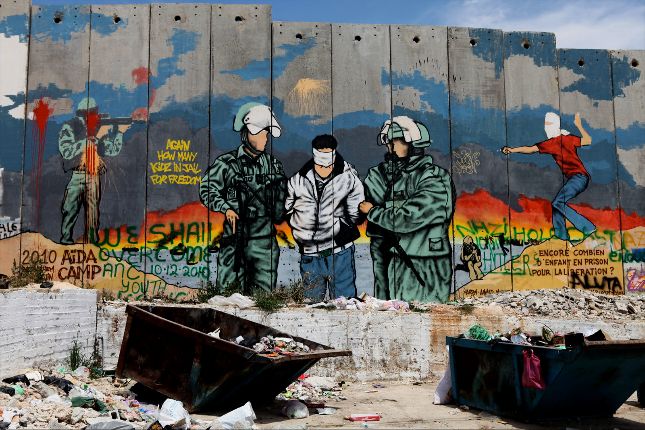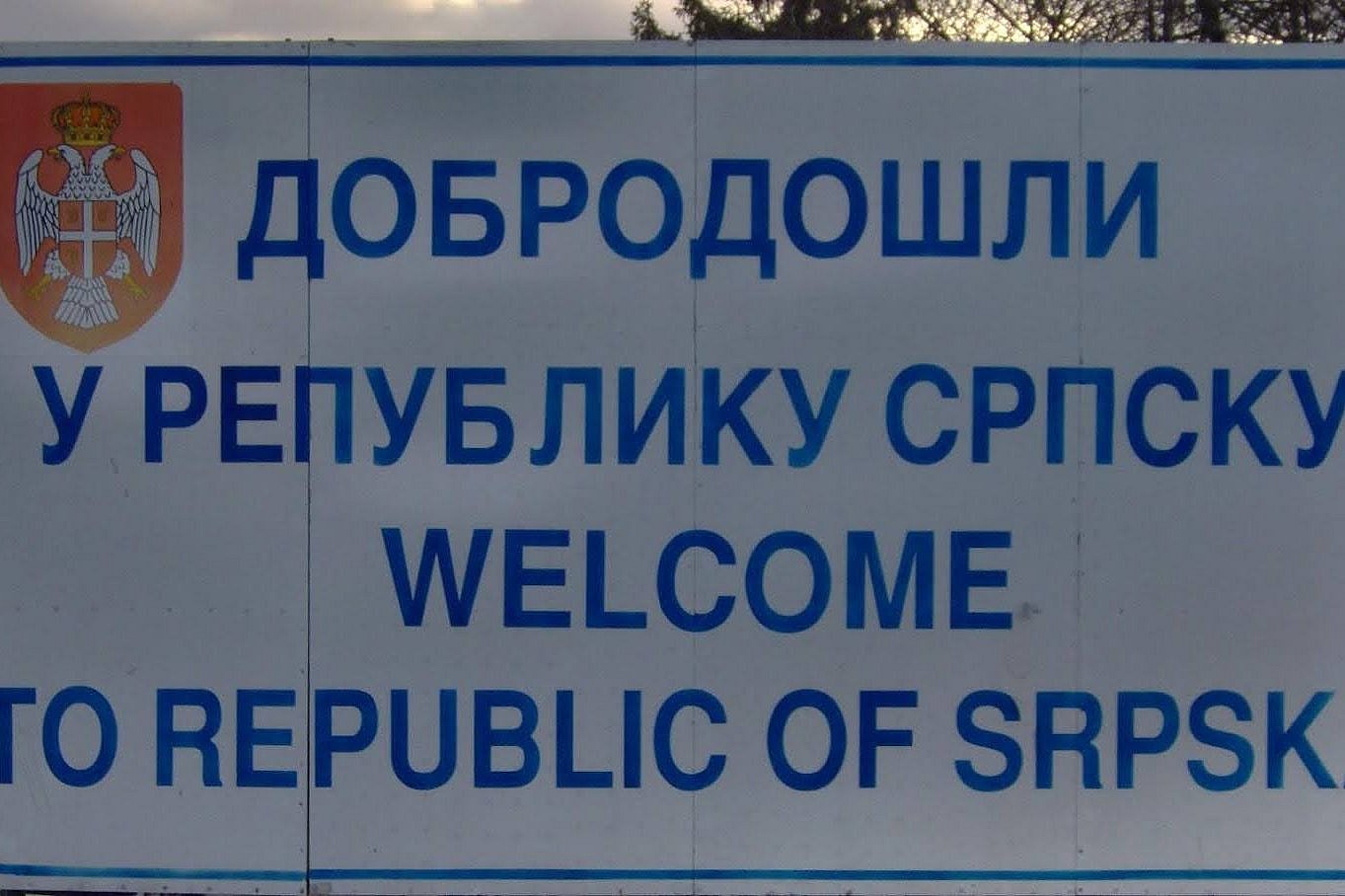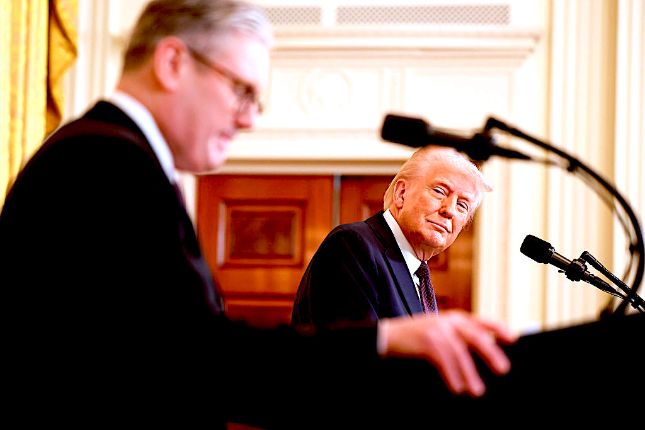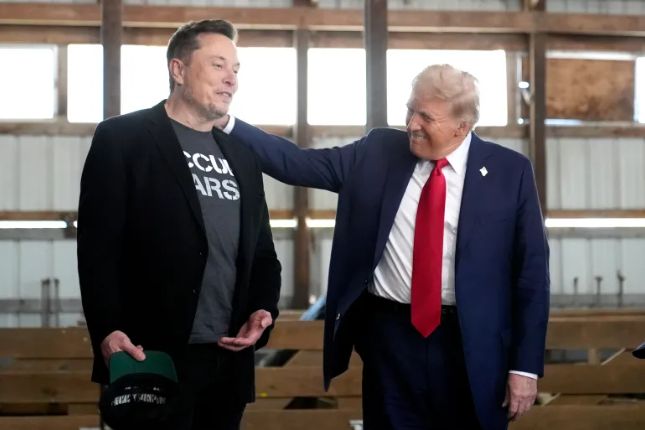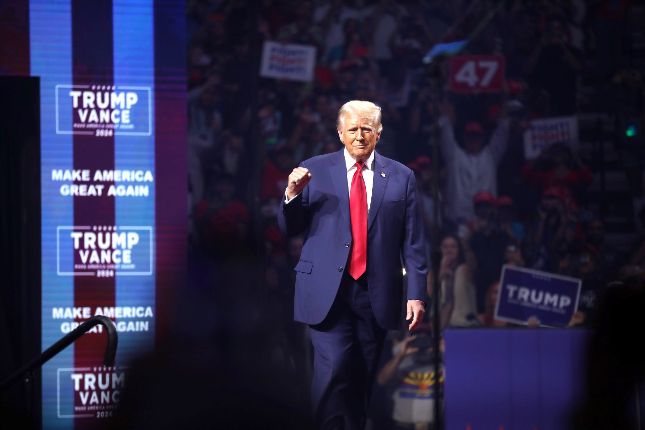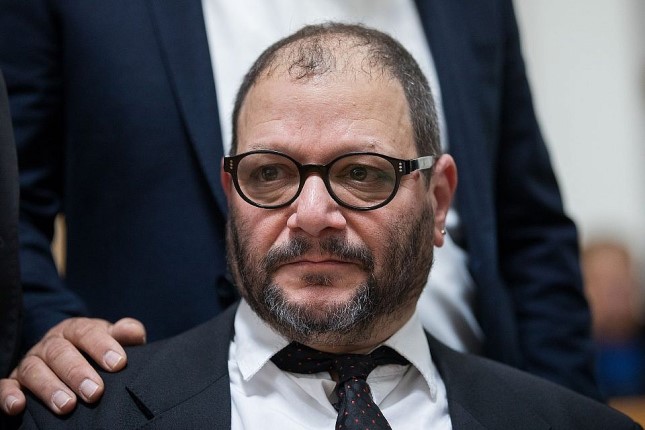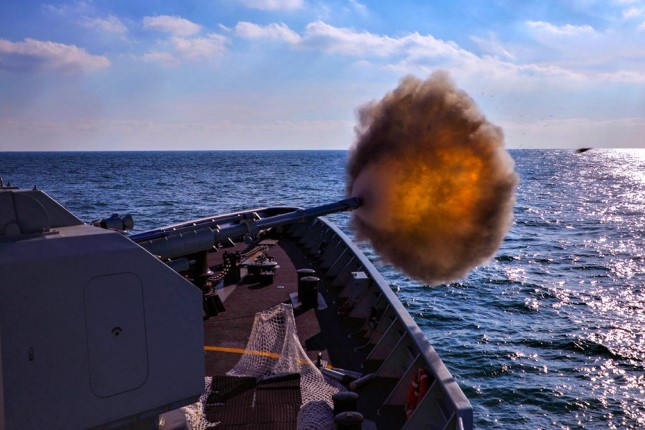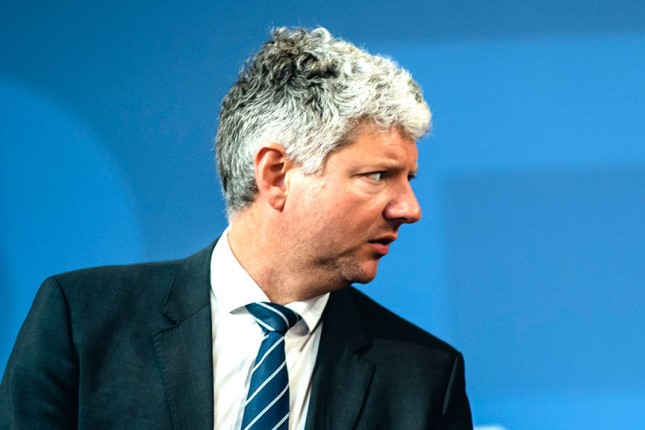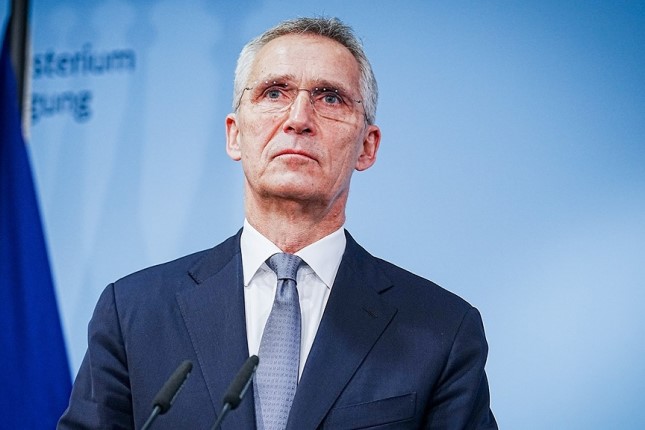The fragile, incomplete and long overdue Israel-Hamas ceasefire agreement has brought huge relief to the millions of Palestinians who have been under daily threat of airstrikes, bombardment and forced starvation for over 15 months.
The numerous scenes of Palestinians celebrating — a boy raising a Palestinian flag at the top of the rubble of his family’s destroyed home; an old man kneeling to kiss the soil as he returned to Rafah; and a journalist taking off his PRESS jacket after the announcement of the ceasefire agreement — are very heartwarming.
There is some hope that this agreement will halt Israel’s genocidal campaign and lead to the release of all the hostages taken on Oct. 7 and the tens of thousands of Palestinian hostages languishing in Israeli jails under largely inhumane conditions.
Senior Hamas officials say they intend to fully abide by the ceasefire agreement. “We will exert the maximum efforts to give this deal a chance to succeed. We are looking for how to prevent the war again, how to protect our people,” Basem Naim, a senior member of the Hamas political bureau, told Drop Site News.
He went on to say that Hamas is prepared to begin fighting again should Israel violate the agreement. “We believe that this is a just cause, a just struggle and we have all the guaranteed right by the international law to resist the occupation by all means, including armed resistance. What we are looking for is an independent state. If we can get it politically or through a U.N. Security Council resolution, this is the preferable way.”
Meanwhile, nothing we’ve heard so far from the Netanyahu government gives confidence that the agreement will last past the first phase.
Israeli Prime Minister Benjamin Netanyahu, who resisted a ceasefire deal for months, has been treating the inked agreement as one he is not planning to see through and uphold.
In a televised speech, he called the ceasefire “temporary.” In that speech on Jan. 18, he declared that if negotiations for Phase 2 do not go well, Israel maintains the right to continue its assault.
“If we need to resume fighting, we will do that in new ways and we will do it with great force,” he said.
Soon after the agreement had gone into effect and Israel released the first batch of 90 Palestinian captives in exchange for three Israeli hostages — and within hours of President Donald Trump’s inauguration — Israel launched a massive military operation in the occupied West Bank, raiding towns and villages and detaining more than 90 Palestinians.
Is it possible that this operation was part of a deal Netanyahu struck with far-right cabinet members so that they would not resign and topple the government?
As reported by CNN, Israeli Finance Minister Bezalel Smotrich, a far-right nationalist who opposed the Gaza ceasefire, said in a statement on Jan. 21 that security in the West Bank had been added to the country’s “war goals.”
In a post on X, Netanyahu said: “We are acting systematically and decisively against the Iranian axis wherever it extends its reach – whether in Gaza, Lebanon, Syria, Yemen, or Judea and Samaria – and our efforts will continue.”
He was quoted in The New York Times as saying that the military operation in the West Bank was aimed at “eradicating terrorism” and would be “extensive and significant.”
While far-right National Security Minister Itamar Ben-Gvir resigned from the government in protest of the ceasefire agreement, Smotrich decided to keep his far-right Religious Zionism Party in the governing coalition after receiving assurances that the genocidal assault on Gaza will resume at the end of Phase 1, with the aim of “a gradual takeover of the entire Gaza Strip.”
In a post on the Telegram platform, Smotrich said: “Look at Gaza, it’s destroyed, uninhabitable, and it will stay that way. Do not be impressed by the forced joy of our enemy. … Very soon, we will erase their smile again and replace it with cries of grief and the sobs of those who were left with nothing.”
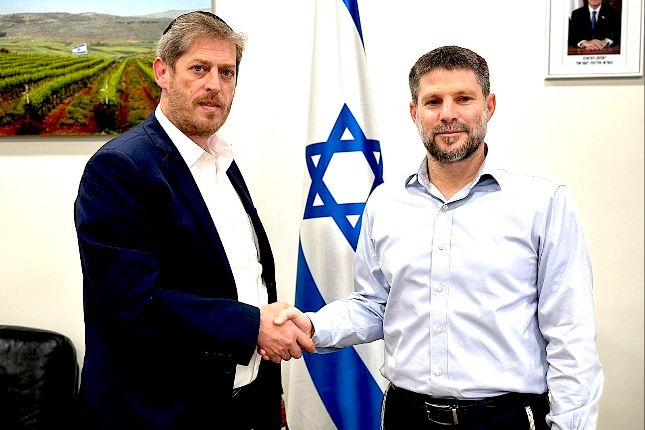
Smotrich, on right, with Zaka CEO Dobi Weisenstern, Oct. 31, 2023. (Spokesperson unit of ZAKA, Wikimedia Commons, CC BY-SA 4.0)
A statistical analysis in the respected, peer-reviewed British medical journal, The Lancet, estimated that more than 64,000 people were killed during just the first nine months of the war, with well over half being women, children and the elderly.
Even with a ceasefire in place, Israeli forces destroyed most of the roads and infrastructure in Gaza over the last 15 months, which will make it very difficult to deliver the needed humanitarian aid to different parts of the Strip.
Chris Gunness, director of communications for the U.N. Relief and Works Agency for Palestine Refugees (UNRWA) from 2007 to 2020, said in a recent piece that, “Ninety percent of the housing stock in Gaza is destroyed or damaged. People will be returning to craters and bombed out shelters where their homes once stood.”
He warned about the Israeli government’s efforts to outlaw and expel UNRWA — the only organization capable of delivering desperately needed humanitarian aid in the occupied territories — and urged that
“All the crossings must be opened 24/7, for the entry of food, water, medicines, personal hygiene products: the full range of humanitarian aid and equipment,” he said.
As Palestinians return to their homes in the north, “The area is full of unexploded bombs and ordnances that need to be disposed, and people don’t have time to wait. They want to come back home,” said Gloria Lazic, a worker for the U.N. Office for the Coordination of Humanitarian Affairs, in a video posted by the agency on Jan. 21.
Promises Trump May Have Made
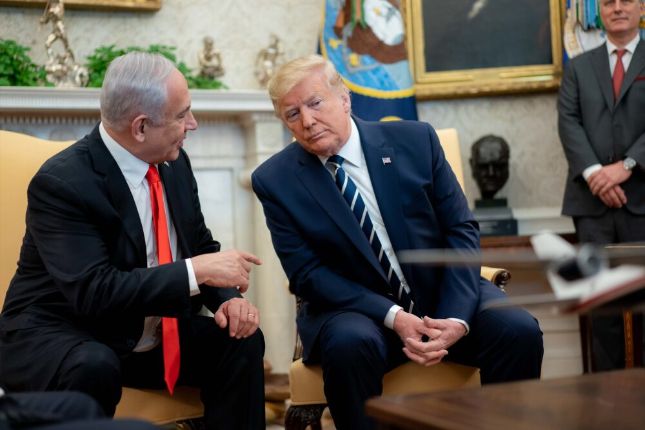
Netanyahu and Trump in Washington in January 2020. (White House, D.Myles Cullen)
The second phase of negotiations will determine the success of the ceasefire agreement and whether it will lead to a complete withdrawal of the Israeli military from Gaza.
Mairav Zonszein, an expert on Israel-Palestine with the International Crisis Group, said: “Israel is very good at breaking ceasefires and making it appear that it wasn’t its fault.”
Daniel Levy, a former Israeli negotiator, told Al Jazeera that Netanyahu is likely to continue provocations to try to “upend” the ceasefire.
“We can expect ongoing efforts to goad and provoke the unravelling of this deal. We’ll see, I’m sure, ugly things going on in the West Bank and East Jerusalem” as well as “aggression against UNRWA,” Levy said. “This is a fragile place to be.”
Two powerful leaders — each with a long track record of lies and deceptions — that are likely to render the peace temporary are Trump and Netanyahu.
On the campaign trail, Trump promised “We’re going to do a lot for Israel; we’re going to take care of Israel.” Immediately following the inauguration, President Trump signed an executive order that rescinded sanctions on extremist settlers in the West Bank who committed violent crimes against Palestinians.
He also reversed President Biden’s restrictions on sending Israel those 2000-pound bombs that can erase entire neighborhoods. I fear that we shall soon find out what kind of a deal was made between Trump and Netanyahu in order to get a ceasefire deal concluded before Trump’s inauguration and what price will Palestinians pay in the months ahead.
Did Trump promise the removal of sanctions on Pegasus, the surveillance company which makes the spyware tool, so Israel can export it to other authoritarian states? Did he agree to support Israel as it keeps troops in southern Lebanon and part of Syria?
Did Trump agree to increased Israeli settlements on stolen Palestinian lands in the West Bank? Or did he promise Israel’s future annexation of the West Bank, a decision favored by Trump’s appointee for U.S. ambassador to Israel, ultra-Zionist evangelical Christian Mike Huckabee?
The global failure to stop the genocide and Western complicity — whether it’s military, financial or diplomatic — does not give Palestinians any hope that the colonial structures of international law and international institutions, such as the United Nations, the International Court of Justice (ICJ) and the International Criminal Court (ICC), will have the ability and will to protect them and safeguard their rights.
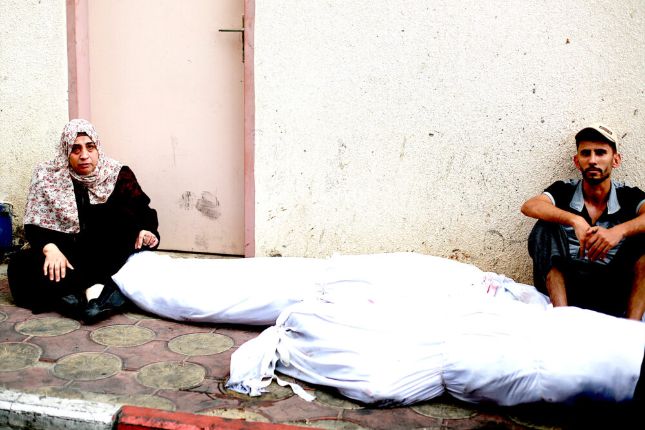
Palestinians with the corpses of people killed by Israeli airstrikes outside the Indonesian Hospital in Jabalia, north of the Gaza Strip, on Oct. 9, 2023. (Bashar Taleb, Palestinian News & Information Agency for APAimages, Wikimedia Commons, CC BY-SA 3.0)
As we have already seen, the U.S. Congress will make certain that Israel will not be held accountable by the U.N., the ICJ, the ICC, or any other international institution. On Jan. 9, the House passed the Illegitimate Court Counteraction Act, which would place sanctions on officials within the ICC because of the arrest warrants it issued for Netanyahu and Yoav Gallant, Israel’s former defense minister. [But the U.S. Senate failed to pass the bill on Wednesday.]
Palestinians’ worst nightmare is that Trump will help speed up Israel’s endgame of the “out-of-state” solution: emptying Gaza of Palestinians and continuing its ethnic cleansing of the West Bank and East Jerusalem — and now southern Lebanon and part of Syria — in order to realize its ultimate goal of a “Greater Israel” Jewish ethnostate.
This will undoubtedly increase instability as it will trigger massive anger and unrest in the entire region and will have global repercussions.
We have already seen movement in that direction with a recent Trump proposal that aligns with Israel’s moves toward ethnically cleansing the Gaza Strip. Trump said that it was time “to clean out Gaza” and urged King Abdullah of Jordan to take in Palestinians.
Trump said that he told Jordan’s King Abdullah in a call on Jan. 25: “I would love for you to take on more, ‘cause I am looking at the whole Gaza Strip right now, and it’s a mess. It’s a real mess.”
He also said he would make a similar demand of Egypt’s President Abdel Fattah el-Sisi: “I would like Egypt to take people …. You’re talking about probably a million and a half people, and we just clean out that whole thing and say: ‘You know, it’s over.’”
“It is literally a demolition site right now,” Trump told reporters of Gaza. “Almost everything is demolished and people are dying there.”
Ahmed Derly, a Palestinian journalist in Gaza, reacted to Trump’s proposal in Middle East Eye: “For 15 months, I lived conditions beyond imagination. I lost my best friends, my home, and my life’s work, and still I remained steadfast on my land in the north. This is not a choice; Palestinians will not leave their land. It is a part of our identity. … We are a people who deserve respect. It is stunning that, after all the suffering we have endured, the president of a major country could simply propose removing us from our land.”
Limitations of the Deal
The nightmare isn’t over for the children of Gaza — those who lost their parents and family members; those who were maimed by the airstrikes; and those who will be traumatized for the rest of their lives by the death and destruction they have witnessed with their own eyes, including children burned alive in their tents or shot in the head by Israeli snipers.
The rage over the complicity of Western governments in the genocide and Gaza’s total destruction — primarily the United States, United Kingdom and Germany, in collaboration with corporate media and academia — will not subside.
The global pro-Palestinian solidarity movement that mobilized students and the younger generation will likely intensify its efforts and protests in the months ahead.
From calls for divestment from arms manufacturers on university campuses to “Tell Congress to Stop Arming Israel” and BDS (Boycott, Divestment and Sanctions) campaigns, numerous pro-Palestinian groups are organizing actions for Gaza in their communities despite attempts to thwart them, putting the issue back in the spotlight. These protesters are the waves of light in a sea of darkness.
An immediate ceasefire was a necessary first step, but it changes little of the reality on the ground when it comes to the Israeli occupation and the siege of Gaza and the daily violence suffered by Palestinians in the West Bank and East Jerusalem at the hands of Israeli soldiers and armed settlers.
In the absence of justice, equality and freedom, Palestinian resistance to Israeli occupation and apartheid will continue as long as occupation and apartheid continue. And this applies to Gaza, the West Bank and East Jerusalem.
No amount of bombardment or military force can destroy the resistance. The right of Palestinians to resist the ongoing occupation is enshrined in international law, including the right to armed resistance.
Without addressing the root causes of the struggle — an end to occupation and apartheid — there will never be peace in Southwest Asia and Israelis will have neither safety nor security. And without freedom and equality for everyone from the river to the sea, every Palestinian will remain a hostage under Israel’s control.
Main photo: Mural on the apartheid wall in Bethlehem, Palestine, 2011 © Michael Rose, Flickr, CC BY-NC-ND 2.0.
Source: Consortium News.
